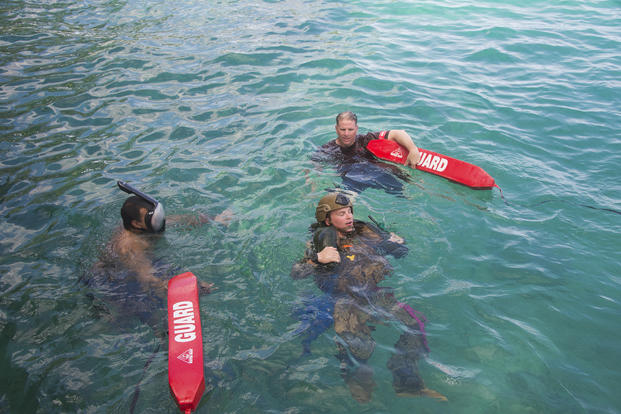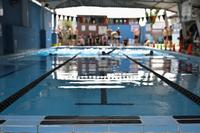There are many schools in our military that require some sort of swimming or water survival test. They teach everything from basic to the most advanced skills about water confidence, depending on your military branch and whether you're in a Special Ops school. There are many ways to improve your confidence in the water, and most require you to be in a pool more often than not, but some techniques can be practiced and honed without a big, lap pool to swim in.
Here is a list of eight ways to improve your water confidence.
1. Swimming Is a Basic Survival Skill
Learn to swim. If you know how to tread water and swim to the water's edge, it potentially will save your life and the life of a child or other adults. Taking lessons is the best way to learn. The odds are, if you can find a public or private swimming pool, someone is giving lessons there. The Red Cross has an excellent swim school for ages 6 to adult. See if there is one near you.
2. Join a Swim Team
There is nothing like swimming as a sport to improve your water ability, technique and confidence. However, being a non-swimming athlete is fine as long as you make time in your training day to prepare for various skills related to military swimming. Skills like basic and advanced conditioning, swimming with fins, treading water, drownproofing and perfecting your techniques in all strokes will be tested in your military future.
3. Going from Good to Better
If you are a decent swimmer but need to improve your technique or conditioning, you will need a pool and some form of coaching. Local swim coaches, friends with similar goals (Special Ops, lifeguarding, etc.), and training videos on YouTube can help. Just search the skills you seek to learn and practice them.
There are many videos on the combat swimmer stroke, underwater swims and swimming workouts. Many others discuss workouts that will help you master the proper techniques and practice the skills that will help you get comfortable in the water using the combat swimmer stroke (CSS). Check out videos of people learning how to swim the freestyle or crawl stroke, breaststroke, and even the elementary backstroke. All of these will help you master proper body position in the water, and as you get better, you can start to add distance to the training and call it a workout. Once you are doing swim workouts, you are well on your way to building comfort in the water.
4. When in Doubt, Tread
People often go into water treading events and tests thinking that treading water is easy. Because of this, they are not mentally prepared for the challenge of vertical swimming. It is easy if you have some body fat to keep you afloat, but if you are fairly lean, you will find that treading water is work -- just as hard, or harder, than swimming. Treading water is a great workout and you can adjust using legs only, or arms only, through the 20- to 30-minute "vertical swimming" workout. If you want to make this workout harder, just add weight. A 10- to 15-pound weight is plenty to challenge the best at treading water. I often will do the tread workout if I'm in a hotel pool that is too small or too warm in which to do laps.
5. Take a SCUBA or Lifeguard Course
There are many schools available to civilians that require and teach the skills of water confidence. Taking a PADI or NAUI SCUBA diving course is a good option if you are considering a future career in military diving or Special Ops. I had a SCUBA certification prior to BUD/S, and that helped me during dive phase. Being a lifeguard adds another level of water competency to your skillset. Saving someone in the water will require you to save yourself first and be confident in your abilities to help others in potentially dangerous situations.
6. Join a Fitness Center with a Pool
Not everyone is so lucky to have a pool nearby their work or home. But if you do, you will need access to a pool several times a week if you are serious about mastering water confidence to the tune of Navy SEALs, Air Force PJs, divers and rescue swimmers, and USMC RECON. It takes 5-6 hours in the water per week for most people to master the skills required to be water confident. See why -- Water Confidence Training (USAF PJ style)
7. Practice Drownproofing
Drownproofing tests come in different arrangements, depending upon the school you are attending. For the basic test, you will be required to tread and float for several minutes, make a flotation device out of your pants and top, and swim underwater. For the more advanced Special Ops level, you will float, bottom bounce, travel 100 meters, do flips underwater and grab your mask with your teeth on the bottom of the pool, because your hands and feet are tied behind your back.
8. Water-Filled Mask
Performing with a water-filled mask will force you to relax while simulating the sensation of being underwater. During many Special Ops and diving schools in the military, you will have to practice swimming, treading, flutter kicks, leg levers and other exercises with your mask on and completely filled with water. This is very awkward at first, but you soon will learn to deal with water in your sinuses and how to breathe in and out of your mouth only. This is not just sadistic training by your instructors; it is a true and easy way to test your ability to relax, even though you are simulating being submerged.
There are many other ways to build water confidence, but the true key is to get in the water more often, and your confidence will grow every day.
Stew Smith is a former Navy SEAL and fitness author certified as a Strength and Conditioning Specialist (CSCS) with the National Strength and Conditioning Association. Visit his Fitness eBook store if you're looking to start a workout program to create a healthy lifestyle. Send your fitness questions to stew@stewsmith.com.
Want to Learn More About Military Life?
Whether you're thinking of joining the military, looking for fitness and basic training tips, or keeping up with military life and benefits, Military.com has you covered. Subscribe to Military.com to have military news, updates and resources delivered directly to your inbox.


















